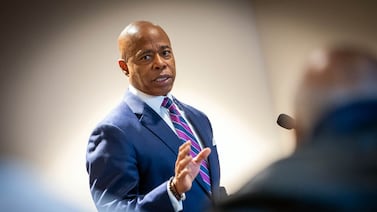Detroit schools finance committee members expressed concern Friday that recent city and state population declines will invalidate the district’s strategies for beefing up enrollment, which rely heavily on expanding preschool programs for the city’s young families.
“I am a touch more pessimistic about student enrollment,” said board member Sonya Mays at the Detroit Public Schools Community District finance committee meeting. “And my viewpoint is almost entirely rooted in what is going on with the greater Detroit population and less specific to what’s happening with the district’s attempts to increase enrollment.”
“I don’t see any sign that Detroit’s population is going to do anything other than continue to decline on a sort of relatively predictable flow.”
Much discussion has circulated around Michigan’s population losses in recent weeks as local and state leaders have drawn up potential solutions and strategies to mitigate further declines. Over the past two years, the state has seen a decline in residents, in addition to lower birth rates. DPSCD’s current enrollment is hovering around 48,000 students, down from 51,000 students prepandemic.
Recent data from the U.S. Census Bureau found Detroit lost roughly 8,000 residents from 2021 to 2022 – a figure Detroit Mayor Mike Duggan has publicly contested, suggesting the city’s population has been undercounted.
At the Mackinac Policy Conference this week, Duggan urged state legislators to reform Detroit’s property tax system to drive growth in Michigan’s largest city, which has shrunk in population over the past seven decades since its peak of 1.8 million people in 1950. Simultaneously, Gov. Gretchen Whitmer announced a statewide council to develop strategies to reverse Michigan’s population woes.
A recent poll from the Gallup Center on Black Voices listed a lack of educational opportunities and safety as some of the main reasons Detroiters have left.
“If you were faced with the prospect of bleeding a couple hundred students year after year, what would you do now to get in front of that?” Mays asked DPSCD Superintendent Nikolai Vitti.
DPSCD plans to spend less money next year on enrollment strategies due to budget restraints. Instead, it will use a smaller budget to market specific schools with available seats and continue to emphasize canvassing through school employees and families.
Among its other strategies, Vitti pointed to the district’s facility master plan, which prioritized facility upgrades at schools with projected neighborhood resident increases, as well as phasing out schools with low student enrollment. Moving forward, he noted, the district would determine whether its smallest high schools are needed in certain neighborhoods.
“We’ve given them six years to grow in enrollment,” he said. “Some of them are definitely doing well, from an improvement of academics and climate culture. But that’s the other area that I would look at is…how many high schools do we really need?”
The district, Vitti said, is looking to increase enrollment over time by expanding pre-kindergarten programs across the city. As part of its facility master plan, the district will house those programs at vacant or underutilized school buildings.
“There are pockets of the city with younger families that are looking for options. And the pre-K option, I think, is a strong one versus others in the city because you have certified teachers,” he said. “That’s just something that we have to market more and then if they have a positive experience in pre-K, I think it’s likely that they’ll stay (for kindergarten).”
Board member Misha Stallworth West suggested district officials “err on the side of caution” when projecting future enrollment gains from pre-K expansion.
“Birth rates are down statewide,” Stallworth West said. “So even trying to capture students from other communities in early ed is tricky.”
Vitti said the district will annually monitor its preschool expansion “over the next three to four years” to determine if actual enrollment numbers match projections, and if they see high reenrollment rates from pre-K to kindergarten. DPSCD’s K-12 enrollment is projected to remain constant next year, according to Vitti, with a potential bump of 335 pre-kindergarten students.
“What I also don’t want to do is just be a provider of pre-K for middle class and upper middle class families,” he said, adding that one of his main concerns is that those families may wind up using the district’s pre-K programs, only to enroll their children in kindergarten outside of DPSCD.
District updates board on status of laid-off employees in the proposed budget
The finance committee also OK’d adding to the agenda for the next full board meeting an amendment to this year’s budget, as well as the district’s proposed budget for the 2023-24 school year. The full board meets again on June 13.
Community information meetings will be held virtually and in person next week to share the details of next year’s budget as well as answer questions from community members.
Vitti estimated that roughly 90% of school culture facilitators and kindergarten paraprofessionals have moved into alternate positions. Under the district’s proposal, those employees, in addition to college transition advisors and administrators at small schools, could be laid off as the district moves to balance its budget following the end of COVID relief funding.
The district, however, has said that some employee groups could still apply for other positions at equal or similar wages. For example, school culture facilitators and paraeducators could apply for positions as cafeteria workers, day-to-day substitutes, or special ed paraprofessionals, among other roles.
The committee approved adding to the full board agenda an amendment to the district’s lease agreement with Marygrove Conservancy, which would extend the district’s lease to 2029 and expand the lease space for its upcoming sixth- to eighth-grade classes. Since 2019, the district has used the conservancy’s Liberal Arts Building to house high school students at the School of Marygrove.
Ethan Bakuli is a reporter for Chalkbeat Detroit covering Detroit Public Schools Community District. Contact Ethan at ebakuli@chalkbeat.org.








